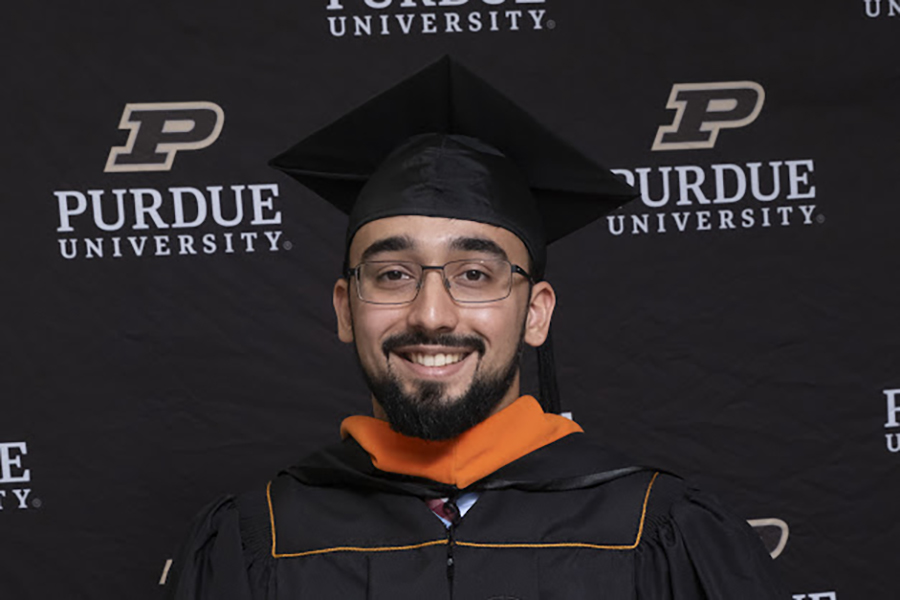Purdue University online master’s in ECE enables semiconductor engineer to explore his field, boost his skill set

Purdue’s No. 1-ranked online master’s in Electrical and Computer Engineering offered the academic rigor Omar Mahboob, a semiconductor engineer for General Motors, was looking for with the flexibility to tailor the program to his professional needs and fit in his schoolwork around his job and family life.
A semiconductor engineer for General Motors whose focus is microcontrollers, Omar Mahboob works with electronic devices that are, well, in control all over the average vehicle. The devices are part of everything from instrument and entertainment systems to cruise control, power steering and braking. They also govern climate controls, external-facing cameras, collision warning systems, and more.
Mahboob’s bachelor’s degree in electrical engineering from Ohio State was tailored to focus mainly on power systems and controls engineering, and he was looking to expand on his knowledge in the field of microelectronics.
“I wanted to understand my field in more detail; specifically, as someone who is pursuing work in the semiconductor industry, it's important to have a strong technical background in the electronics space,” Mahboob said.
Purdue University’s 100% online Master of Science in Electrical and Computer Engineering – ranked No. 1 nationally by U.S. News & World Report – was just what he needed.
“Looking at my options for online electrical engineering degrees I thought Purdue was the best choice from a prestige standpoint and from an education standpoint,” Mahboob said. “The cost per credit hour was very competitive compared to the other options that were out there.”
With a job, a family and other interests including, enjoying outdoor activities like camping, hiking, barbecuing and soccer, Mahboob needed a master’s program he could fit in around his other commitments. Purdue’s online program allowed him the flexibility to do his schoolwork when it worked for him, generally parts of evenings and weekends. By taking three credits per semester, he was able to finish in three years – and GM helped pay for it through its Tuition Assistance Program.
The online program from Purdue’s Elmore Family School of Electrical and Computer Engineering also was flexible in another important way. The battery of elective courses available allowed Mahboob to tailor the curriculum to his professional interests and needs.
“Overall, I thought it had a very good selection of classes, electrical engineering classes and general electives, that one could take while doing the program,” Mahboob said.
His favorite was an embedded systems course that had students working with a “breadboard” for building circuits, a microcontroller and Python programming to make the system perform various functions, the kind of practical hands-on learning for which Purdue is well known.
Collectively, the electives he was able to take presented, as he had hoped, the opportunity to explore the electronics domain and advance his expertise. That included a rich suite of one-credit courses covering a variety of topics and offering a breadth of knowledge.
“It allowed me to get a good background in how those systems typically work and enhance my understanding,” Mahboob said. “It gave me a better understanding for the projects I work on today, in the position that I'm in right now.”
Taught by internationally known faculty from Purdue’s flagship West Lafayette, IN, campus, the online master’s program also offered the kind of rigor for which Mahboob was hoping, a dedicated faculty advisor and a professional student support team.
“It is a master's degree, so you're going to be treated like a master's student,” Mahboob said. “It can be challenging at first, but you'll get the hang of things as it goes on. It made me feel like I was getting the same degree – and it is the same degree – as in-person. Purdue University offered a world-class online degree.”
The master’s program offers several focus areas, among them a concentration in microelectronics and advanced semiconductors. Other focus areas include automatic control; communications, networking, and signal and image processing; computer engineering; fields and optics; microelectronics and nanotechnology; Schweitzer power and energy systems; and VLSI and circuit design. Or students can build a plan of study to incorporate multiple areas and tap courses available in emerging areas such as AI, big data and data mining, the IoT, and quantum computing.
To learn more about Purdue University’s No. 1-ranked online Master of Science in Electrical and Computer Engineering, visit the program’s website.
Writer/media contact: Greg Kline, gkline@purdue.edu
